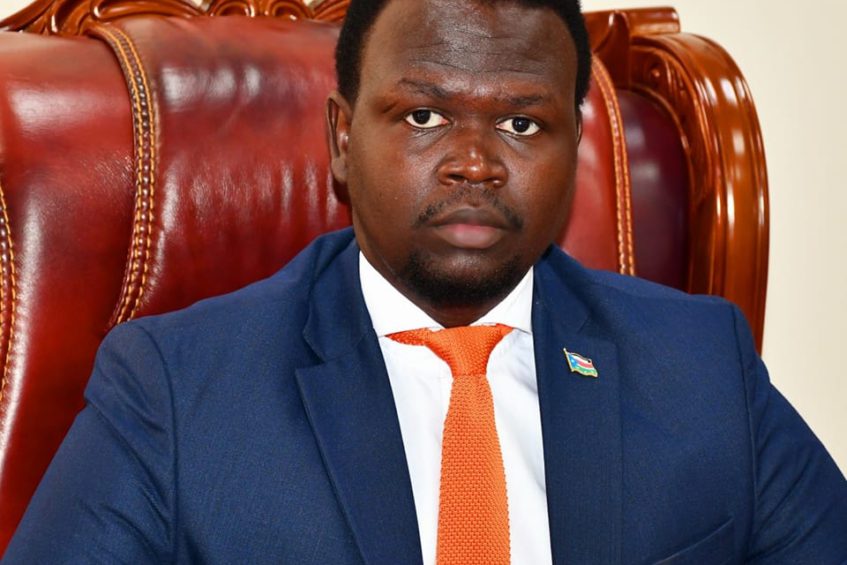
Puok Both, SPLM-IO Director for Information, also Acting Press Secretary in the Office of the First Vice President - Courtesy
The Sudan People’s Liberation Movement – In Opposition has accused President Kiir’s party, the SPLM of restricting political space and freedom of speech.
The Acting Press Secretary in the office of the First Vice President says his party is concerned by the “shrinking civic space” in the country.
Puok Both accused the main peace party – SPLM – of intimidating and politically harassing some members of the SPLM-IO in the state.
He cited disruption of its cadres meeting in Aweil by security forces last year in October.
This he says is an abuse of the right to freedom of expression enshrined in the constitution.
“We, as the SPLM-IO, we are ready for elections but before jumping into the elections, we need to make sure that a conducive environment is at place so that the people of South Sudan have the liberty to elect the leaders that they think that they can lead them in the future,” Both said.
“All the freedoms must be there, the freedom of speech, freedom of association so forth. I cannot go outside now and yell SPLM-IO viva at night because there is no political space in the country.
“We also need to have a permanent constitution in place before talking about elections. South Sudanese [returnees] must return back first so that they can take part in the elections. We also need to conduct a census.
“Our members are being harassed in different areas in South Sudan. When SPLM-IO in Northern Bahr el Ghazal, Aweil, was conducting a meeting, the security came to shut down the meeting.”
In response, the ruling SPLM’s deputy secretary for political affairs refuted the claims.
Santo Malek said all parties are free to conduct their political activities as enshrined in the constitution.
“There is political space for other political parties, and as I speak, the SPLM-IO they are running their activities across the country,” Malek said.
“Recently you have comrade Sarah, the governor of Western Bahr el Ghazal, she launched the activities in Wau normally and she has been active, she is going on and nobody stopped them.
“They [SPLM-IO] conducted their activities, they had two conventions, we were delegated and we attended the convention of the IO in the town and that demonstrates that the SPLM-IO is opening political space for other political parties.
“If the other political parties don’t have programs and political activities, then it is not our problem.
“The freedom of speech and political space he is talking about, whatever is happening is part of their political space and freedom of speech. Whenever you want to say something, you can say it because we have the full freedom.”
In December last year, the Troika countries called on the unity government to guarantee unrestricted freedom of expression, assembly and peaceful protest as stipulated in the transitional constitution.
Civil society activists often face intimidations, harassments, arbitrary arrests, and detention by security organs in the country.
In August 2020, the Vice President, Dr. James Wani Igga reminded government institutions to facilitate access to information and the freedom of media for South Sudan to prosper.
The Roman Catholic Bishops in South Sudan also raised similar concerns about the shrinking freedom of speech, freedom of press, and freedom of association and the attack on journalists in the country.
Political space is an arena in which input from citizens is continually being received and taken into account by the governing authorities.
While freedom of speech is a principle that supports the freedom of an individual or a community to articulate their opinions and ideas without fear of retaliation, censorship, or legal sanction.
According to the National democratic Institute, without active citizen involvement in political life, public officials may be unresponsive to their constituents and the basic rights and freedoms of democracy can go unrealized.
Since South Sudan’s independence in July 2011, freedom of expression has
Article 24 of the South Sudan Transitional Constitution states that every citizen shall have the right to the freedom of expression, reception, and dissemination of information, publication, and access to the press without prejudice to public order, safety or morals as prescribed by law.
Support Eye Radio, the first independent radio broadcaster of news, information & entertainment in South Sudan.
Make a monthly or a one off contribution.
Copyright 2024. All rights reserved. Eye Radio is a product of Eye Media Limited.